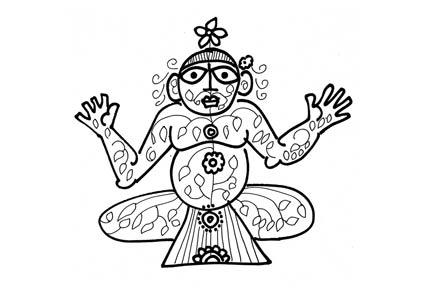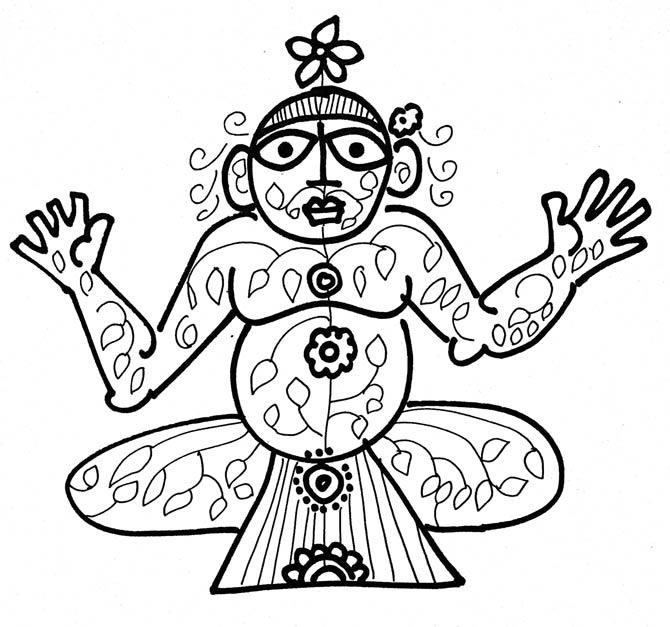The 19th century saw Hinduism being reframed for two reasons. First was missionary activity that, with its aim of gaining converts, consciously spotlighted aspects of Hinduism that the elite could not explain and found embarrassing


Illustration/Devdutt Pattanaik
ADVERTISEMENT
 The 19th century saw Hinduism being reframed for two reasons. First was missionary activity that, with its aim of gaining converts, consciously spotlighted aspects of Hinduism that the elite could not explain and found embarrassing.
The 19th century saw Hinduism being reframed for two reasons. First was missionary activity that, with its aim of gaining converts, consciously spotlighted aspects of Hinduism that the elite could not explain and found embarrassing.
Second was exposure to humanistic values of the Enlightenment, with ideas such as equality and justice. The reframing that followed came to be known as the Hindu ‘renaissance’. The choice of term, ‘renaissance’, was an obvious reference to European ‘renaissance’ of the 15th century when religion was confronted with reason.
This reframing was not homogenous. Different groups moved in very different directions. Some rejected popular Hindu rituals that involved, amongst other things, the worship of images, trees and cows. Others sought to create scientific (often pseudo-scientific), or at least logical (or pseudo-logical), explanations that justified the rituals. Some saw the customs and beliefs as having gone through corruption, in need of purification. Others felt the customs and beliefs were perfect, and needed no modification; they were simply misunderstood. This diversity becomes obvious when we study two major Hindu religious leaders of this period: Swami Dayanand Saraswati and Swami Vivekanand.
Dayanand was born in Gujarat while Vivekananda was born in Bengal. Both came from affluent families. Both were well educated. Both chose to be monks, rather than householders. Both believed in equality justice, and universal brotherhood. Both believed in nationalism, and freedom from British rule. Dayanand was fluent in Sanskrit, loved to debate, but spoke increasingly in Hindi to make his idea accessible to the masses. Vivekananda was fluent in English and famous for his oratory; it was he who introduced the West to Hinduism. Both set up organisations to spread their ideas, Arya Samaj and Ramakrishna Mission. Both rejected the idea of caste. Both opened their organisations to women. Both Dayanand and Vivekanand had huge followers, Dayanand mostly in Hindi speaking areas of the north while Vivekanand in the eastern and southern parts of India.
But the two men had very different views on the Vedas. Dayananda gave more importance to the Samhitas, the collection of Sanskrit mantras, which he saw as divine revelations. Vivekananda on the other hand focussed on Upanishads, which formed the basis of the philosophy known as Vedanta, which means acme of Vedic thought. Dayanand was completely against the Puranas, idol worship, and temple rituals, but valued the yagna. Vivekananda, as a follower of Ramakrishna Paramhansa, who was a priest at a Kali temple, valued the traditional veneration of the Goddess as an icon.
Both had many critics — some sincere who disagreed with their interpretations; others simply envious of their success, or plain cynics. Dayanand was criticised for his rather creative interpretation of Vedic verses, his criticism of other religions, and his concept of purification (shuddhi) to reclaim converts and bring them back to the Hindu fold. Vivekanand was criticised for travelling over the sea (that traditionally led to loss of caste), for his comfort with non-vegetarian food, and his nationalistic reframing of Hinduism.
In the 21th century, we would like to assume that former Hindu leaders thought alike, and had no critics. But, like all things Indian, even the Hindu renaissance was complicated, messy, diverse and dynamic.
The author writes and lectures on the relevance of mythology in modern times. Reach him at devdutt@devdutt.com
 Subscribe today by clicking the link and stay updated with the latest news!" Click here!
Subscribe today by clicking the link and stay updated with the latest news!" Click here!






